Yury Uskov, iSpring: ''You don’t have to live in Silicon Valley to develop quality software''
An entrepreneur from Mari El, Russia founded a company with $4,5 million in revenue and customers from Google, Tesla and Microsoft
''There's no place like home.'' That's how Yury Uskov, web developer and CEO of iSpring, the Yoshkar-Ola-based software company, describes his philosophy. After he became dissatisfied with his job, which did not meet his professional ambitions, he decided to create his own company, which now provides software and services to industry giants like Google, Tesla, and Microsoft. Noticing the lack of talent in his native Yoshkar-Ola, he also founded a vocational school and early education program for young people to learn programming from the ground up; he continues to provide financial and personal assistance. Read the story of the entrepreneur in the material of Realnoe Vremya.
If you want something done well, do it yourself
If you ask Uskov about how his company got started, the story begins long ago. The Mari El Republic has never been rich in resources — there is no oil there. During the Soviet era, the main industry was factories which produced materiel for the military. At the same time there appeared universities to train specialists to work in these factories. In the 1970s, a computer science department was established at the local technical university (polytech). It graduated an entire generation of programmers who created a whole IT industry in Yoshkar-Ola and the entire region. According to Uskov, ''The graduates from that department didn't move to Moscow or St. Petersburg but decided to stay in Yoshkar-Ola; many of them established their own companies, about five of which are world-renowned.''
In the 1990s, many local large businesses were shut down or went out of business, and many people were left without work; but graduates from the computer science department never suffered from the economic downturn, and still found projects overseas. ''There's always a shortage of qualified people. When the CTO of Sberbank came to us asking for programmers, we told him he was too late; they were all already involved in projects — and that was only 1997,'' says Uskov.
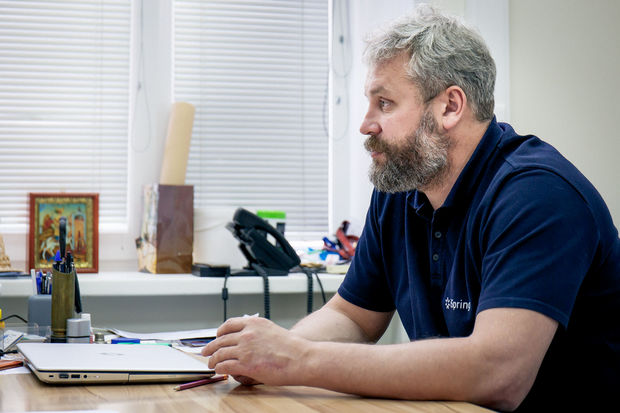
But we had bigger ambitions: we wanted to create our own product because that's a completely new level of expertise, different from when you do custom jobs
Uskov recalls a particular professor, Alexander Polovinkin, who promoted programming at the polytech and created a special department for teaching engineering specialties. The professor then left, but the principles and graduates remained, the latter then founded their own IT companies. According to Uskov, their total revenue is about 2 billion rubles a year (about $35 million) — a decent figure for the city of Yoshkar-Ola, which has a population of about 250,000. In addition, the industry is quite dynamic. Thirty percent a year is considered a low growth rate.
At the beginning, the iSpring team consisted of four people, two of which were the directors: Yury Uskov and Alexander Galochkin. The company's original name was CPSLabs, and they mostly worked on complex custom projects. ''But we had bigger ambitions: we wanted to create our own product because that's a completely new level of expertise, different from when you do custom jobs,'' says Uskov.
''There's an Italian designer studio that makes shoes for presidents, superstars and so on. One of their clients is Putin. The shoemakers come to him, take his measurements, fly back to Italy, and make a pair of shoes. Putin wears them for a while, then the pair is taken back to Italy again and they are taken apart and reconstructed from scratch. As a result, the shoes fit him perfectly. When you work on custom projects, you make a good 'first pair.' But you also realize that you could make a second pair and even a third and fourth. When you work for yourself, you have a chance to make that happen,'' the entrepreneur explains.
Uskov's company worked on several distance learning projects, including for US companies based in Phoenix, Arizona. ''That city is famous for being home to many diploma mills, so I was very skeptical about it,'' says Uskov. His skepticism passed when he created a very successful PowerPoint presentation converter program in Flash and found that most people used the product for e-Learning.
''I realized that the idea wasn't so bad. From the 'diploma mill' standpoint, not so much, but for corporate training, definitely. Sure, we can't teach someone to swim or perform surgery, but we can solve a lot of other problems. In the end, we decided to focus on a product for creating online training courses, organizing training, and monitoring the process,'' says Uskov.
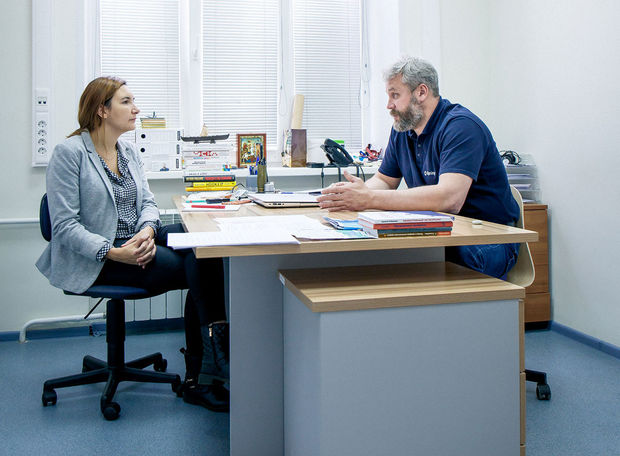
This summer we saw an explosion of interest in distance learning. Everyone — from steel companies and airlines to Rosatom — now understands how to use this tool
The company started with a small product, the development cycle of which was about six months. The start-up investments consisted of the profits earned from third-party orders. The product immediately began to sell well abroad. Uskov's first customer was introduced to him by an acquaintance, and then the product began to spread by word of mouth. They didn't do any marketing besides creating a website. By this time, the original team had gone their separate ways. Uskov focused on his iSpring project, and Galochkin founded TravelLine, which makes software for the hotel business. Their joint venture, CPSLabs, though quite successful in its own right, was finally closed.
Becoming #1 in Russia
Now, Russian companies make up only a tenth of iSpring customers; the majority of its revenue normally comes from the US and Europe. The main focus is on the corporate sector. However, Uskov believes that the ratio will vary greatly because the Russian market almost doubles every year.
''This summer we saw an explosion of interest in distance learning. Everyone — from steel companies and airlines to Rosatom [Russian State Atomic Energy Corporation] — now understands how to use this tool,'' says Uskov.
There are many applications. Using e-Learning technology, companies solve the problems of training remote employees in branch offices, initiating new employees, teaching safety measures, encouraging corporate culture, and showing how to communicate with customers. What's more, not only small and medium businesses, but also large corporations are interested in using this technology. According to Uskov, the price for iSpring tools is quite affordable for any business – it starts from 25,000 rubles ($720), and the distance learning system for 50 users costs 58,000 rubles ($1,670) a year. When people bring up the price gap between iSpring and its competitors, the entrepreneur laughs, ''In his day, Henry Ford made a quality car at a very affordable price. What happened then? He changed the way of life. So did Microsoft. Moreover, we strive to make a quality product available to a wider audience.''
The tactics have proved successful. In 2016, iSpring earned $4,5 million. This year, the revenue is projected to be $6 million.
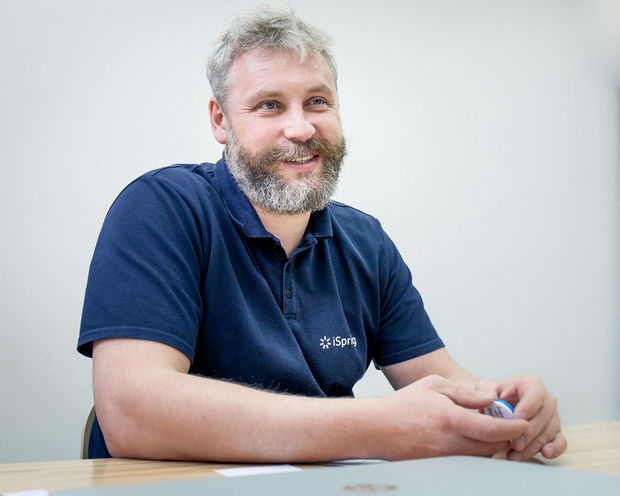
In his day, Henry Ford made a quality car at a very affordable price. What happened then? He changed the way of life. So did Microsoft. Moreover, we strive to make a quality product available to a wider audience
The company initially focused on the product; Uskov wanted to perfect it as much as possible. Now he is working to make the client a top priority: not only providing course templates, but also helping to create courses for specific needs. The goal is to bring the implementation period to a week or a month. According to Uskov, many consider it normal to do training cycles for six months or a year, but it's crucial that investments in education bring results to businesses.
''Among the developers of distance learning systems around the world, we are in the top ten of the most accurate. I think this is good because more than 2,000 software products are competing for a place in this rating. In Russia, the struggle for leadership is just beginning, the market is still young, and has been lagging behind the rest of the world for several years. In just the next couple of years, we'll see who takes the leading position. Most likely, there will be one large company and a few small ones,'' says Uskov.
The entrepreneur is not afraid of competition. According to him, any product can be copied. However, due to the complexity of the product, the process of copying is hugely time-consuming. ''You can protect the product with patents in three layers, but the best product protection is protection by complexity,'' explains Uskov. In his opinion, the majority of modern startups don't know how to make a good product.
''The popular notion is to get start-ups to start selling. But sales is a standard process that takes about 2-3 months. The real problem is just the quality of the product,'' says the entrepreneur.
''We get great talent from everywhere''
Yury Uskov knows firsthand about the situation with the staff deficit in his area and neighboring regions. At one time, he was looking for specialists in the nearby city of Kazan and did not do well; so, he decided to create a personnel reserve for his company, and, incidentally, for the whole region.
''As our company began to grow, we began to wonder where to get new talent. We noticed that there was a problem with the people who studied at the polytechnic. They were smart guys, but they needed to be 'broken in' because they were trying to be expert programmers from day one but doing everything wrong. It really irked me, until one day a wise man told me, 'you can train new talent yourself,'' the entrepreneur recalls.
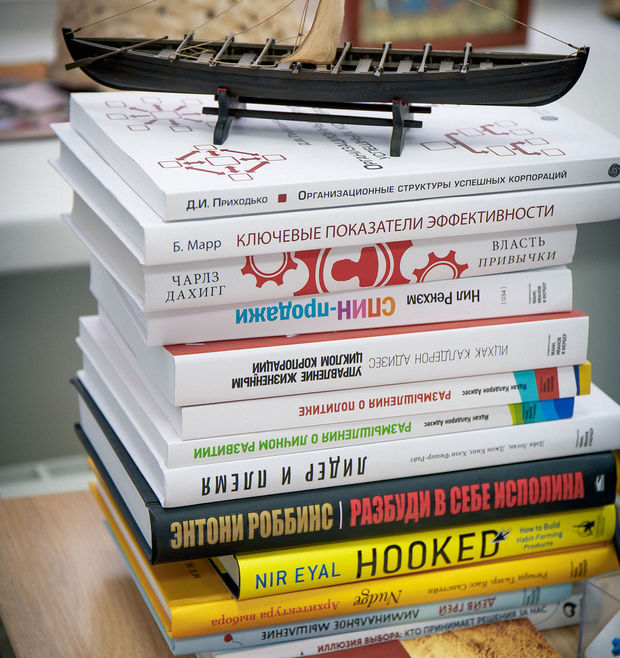
I came to realize that the lack of quality teaching in science disciplines can be compensated by computer training. Besides, with the help of information technology, one can develop systemic thinking, one of the key qualities of educated people
As a result, in 2004, Uskov went to teach at the university. Then he created Infosphere — his own school for children from 1st to 8th grade, and then Infotech — a vocational school for students who've decided that they want to become programmers.
''As a father myself, I'm concerned about the quality of teaching in schools, and I came to realize that the lack of quality teaching in science disciplines can be compensated by computer training. Besides, with the help of information technology, one can develop systemic thinking, one of the key qualities of educated people,'' says Uskov.
The school and vocational program are both entirely funded by iSpring. The company allocates at least 10 million rubles ($175K) a year for these endeavors. Thus far, no one else has offered to share the costs.
''Actually, this is the task of the government, but apparently they have their own problems. So I'll do it myself, I do not mind. I used to think that it was important everything connected with higher education, but now I understand — in the first place the secondary school is important because we invest in the child in their most productive years,'' believes the businessman.
''Normally, this is the government's job, but I guess they have other problems. So I'll take care of it myself, I don't mind. I used to think that everything related to higher education was important, but now I understand that secondary school is even more important because we're investing in children at their most productive age,'' says the entrepreneur.
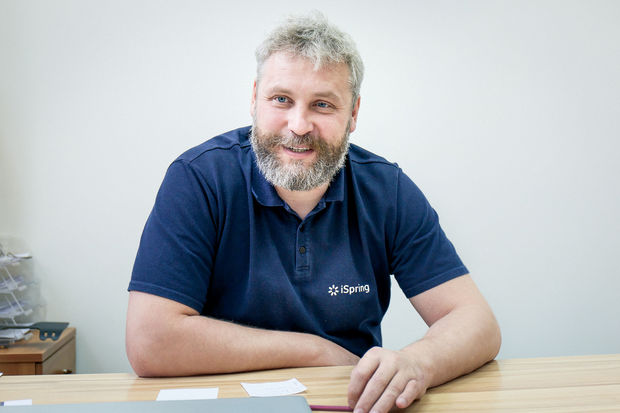
I used to think that everything related to higher education was important, but now I understand that secondary school is even more important because we're investing in children at their most productive age
Now, 500 children are studying in Infosphere. The company has dedicated two full floors in its office building to the educational project. Those who receive training in Infosphere, and then in Infotech, never have problems finding a job. According to Uskov, the company has a gentleman's agreement that the graduates will come to work for them. Still, this isn't the prime motive.
''It's more important for me that the graduates will stay in Mari El and work to grow the industry here. In addition to iSpring, other strong companies here in Yoshkar-Ola are also looking for these candidates, like TravelLine and Moneta.ru [a Yandex.Money competitor]. In fact, we've managed to build a pipeline from primary school to higher education which supplies talented professionals to the whole region,'' says Uskov.
The entrepreneur has never thought of moving his business to another city. ''There's a suburb of nearby Kazan called Innopolis, which is also famous for its IT culture, but doesn't differ from Yoshkar-Ola in terms of business opportunities,'' says Uskov, though he admits that in Moscow it's much easier to find good specialists in virtually any field. Both of Uskov's sons also work as programmers. Moreover, the eldest son taught classes for several years at Infotech, and this year, the youngest became a graduate of the vocational school.